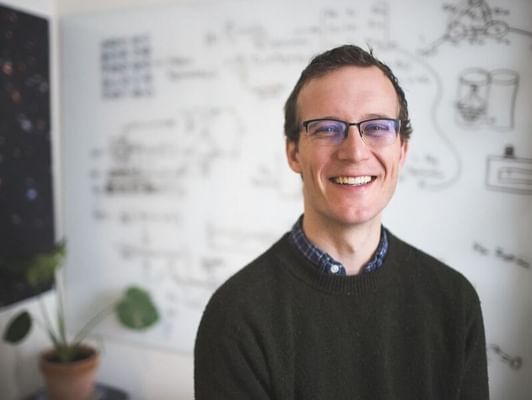- Undergraduate
Bachelor's Degrees
Bachelor of ArtsBachelor of EngineeringDual-Degree ProgramUndergraduate AdmissionsUndergraduate Experience
- Graduate
Graduate Experience
- Research
- Entrepreneurship
- Community
- About
-
Search
All Thayer News

Dartmouth Engineering Professor Receives DARPA Young Faculty Award
Oct 03, 2023 | by Catha Mayor
Mattias Fitzpatrick, Assistant Professor of Engineering and Adjunct Assistant Professor of Physics at Dartmouth, received a Young Faculty Award from the Defense Advanced Research Projects Agency (DARPA). The award will support his lab's work using existing quantum computing hardware to enable a new class of quantum sensors with enhanced sensitivity to magnetic fields.

Dartmouth Engineering professor Mattias Fitzpatrick. (Photo by Katie Lenhart)
Quantum sensors are designed to detect tiny changes in such things as magnetic fields, electric fields, mechanical strain, and temperature. Enhancing their ability to make precise measurements at the atomic level could facilitate discovery in a wide range of areas such as materials science, computing, and fundamental physics.
"We want to leverage insights from quantum science to engineer quantum and quantum-inspired systems to find new approaches to sensing, information processing, and secure communication," says Fitzpatrick. "The primary goal is to harness a fundamental understanding of quantum physics to build enhanced sensitivity into a given sensor."
The project, titled "Non-Reciprocal Lattices of High-Q Microwave Cavities for Enhanced Magnetometry," will leverage hardware typically associated with quantum computing for quantum sensing applications, thus serving as a bridge between the two fields.
"Electric and magnetic fields form the basis of electromagnetism, the most commonly utilized fundamental force, including in the Earth's core and crust, in atoms and molecules, and in semiconductor technologies," explains Fitzpatrick. "In this work, we will take inspiration and techniques from quantum computing to develop new devices for quantum sensing. Our lattice-based approach will allow us to engineer different lattice geometries that are relatively simple to build and can be scaled into larger lattices to exhibit high-performance magnetic field sensing."
Fitzpatrick earned his bachelor's in physics and mathematics from Middlebury College, and his PhD in electrical engineering (applied physics) from Princeton University. At Princeton, he worked with Professor Andrew Houck on superconducting circuits and then received an Intelligence Community postdoctoral fellowship to work on quantum sensing in the lab of Nathalie de Leon. From there, he went on to work on quantum computation at IBM's Thomas J. Watson Research Center. His research focuses on new ways to manipulate the quantum states of photons in superconducting circuits to enable the next generation of quantum computers.
The DARPA Young Faculty Award program aims to identify rising stars in junior research positions and provide funding, mentoring, and industry and DoD contacts to encourage research ideas in the context of national security needs.
For contacts and other media information visit our Media Resources page.
